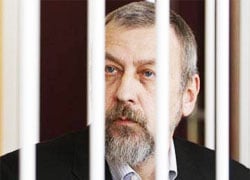Lukashenka’s administration in no hurry to release Sannikov
14- 16.02.2012, 12:54

The petition for pardon, extorted from the presidential candidate by torture and threats, has just been received by the administration of the Belarusian dictator allegedly.
The documents from the colony Vitsba-3, where Andrei Sannikov, a presidential candidate is serving the sentence, was received by the Presidential Clemency Commission on February 13 only. On this day the documents were officially registered in the office of the Presidential Administration.
TUT.by has been told about that by a deputy chairman of the commission, the head of the citizenship and clemency department of Lukashenka’s administration Alyaksandr Kisyalou.
We remind that according to information of the Interior Ministry, Andrei Sannikov wrote a petition for clemency on December 23, 2011, and the administration of the colony forwarded it to the Clemency Commission on January 23, 2012. Sannikov’s wife Iryna Khalip informed that the petition for clemency was written by her husband back on November 20.
The documents on the agent of Sannikov, Zmitser Bandarenka, had been received by the commission as well. It happened on February 14. He wrote a petition for pardon on February 1.
Presumably, the issue of Sannikov and Bandarenka’s pardon is to be considered at the next session o the Clemency Commission. However, it is hard to say when it is to take place. Under Decree Nr 250 of December 3, 1994, which defines the procedure of considering pardon issues, the commission is to hold sessions at least once a quarter. It happens more often in reality. Thus, last year the commission gathered 10 times, and the last session was held in December 2011.
As said by Kisyalou, the petition for pardon are received for consideration of the commission regularly, and there could be 30, 40 or 50 petitions from imprisoned persons at the same time. Besides, there are appeals from people who appeal for release from criminal liability at the stage of pre-court examination.
The Citizenship and clemency department of Lukashenka’s administration is to carry out “organizational and technical work”: to ensure correctness, fullness and objectivity of documents.
As for Andrei Sannikov, at the moment “documents on the case are being collected,” but as long as a lot of information had appeared in mass media that pressure had been exerted on Sannikov allegedly, lots of loud statements had been made (even from such well-known leaders of the past as Zyanon Paznyak), the commission should certainly deeply and carefully study all the circumstances; and a certain amount of time is needed for that undoubtedly,” he added.
Under Decree Nr 250, the received documents are to be forwarded to the Prosecutor General and the chairman of the Supreme Court, who are to give their opinion on this issue within a month. After opinion of the General Prosecutor’s Office and the Supreme Court received, all the documents are to be given for consideration of the commission members.
“The Commission is no adopt a decision after every member of the commission who had been sent al the necessary documents about every person for study, comes to the session having awareness of the situation with every person on whom the voting would be carried out,” A. Kisyalou said.
The decision is to be adopted at the session by an open voting. Then it is to be received by Lukashenka with a package of documents. The decision on pardon is adopted by Lukashenka.
At the same time, as A. Kisyalou explains, there are cases when a discussion starts during the session, and the commission decides to return to consideration of the issue at the next session.
“There cannot be a certain term for consideration of a concrete material, as objectivity of evaluation is needed. Sometimes the commission has a right to postpone consideration of an issue for the next session, when some additional documents are required and so on. Formal approach has no place here,” A. Kisyalou said. At the same time, he stressed that “the commission works very hard.”









